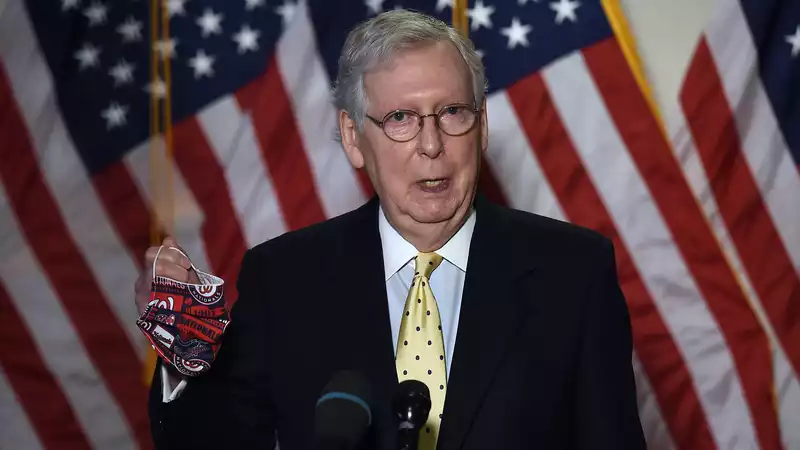The new coronavirus relief bill revealed Tuesday (September 8) by Senate Majority Leader Mitch McConnell (R-Kentucky) does not include stimulus check 2.
The $500 billion "skinny" bill instead seeks to bypass stalled stimulus spending negotiations with a targeted effort. The bill includes enhanced federal unemployment benefits of $300 per week through December 27, support for payroll protection programs, and liability insurance for agencies attempting to reopen amid the ongoing coronavirus crisis.
Politico reports that the Senate is scheduled to vote on the new bill on Thursday as lawmakers from both parties and the White House seek to agree on a stimulus package.
"The American people don't need to keep debating what is perfect, they need to actually make the law," McConnell said, insisting that the vote "will happen this week."
However, it is unclear whether the "skinny" proposal will have enough votes to clear a majority, much less exceed the Senate's 60-vote threshold for passage.
The $500 billion bill is not only far from the Democrats' wish list for a big $2 trillion bill that includes a stimulus check2, but it also appears to lack Republican support; according to Politico, Senator Rand Paul (Republican) "is not in favor of borrowing any more money I am not in favor of borrowing any more money."
The bill would need at least 51 Republican votes to have a symbolic majority. Because of the Senate filibuster rule, 60 votes are needed for passage, but that will not happen unless several of the 45 Democrats (and two New England Independents who vote Democratic) break ranks.
The amount of the two stimulus checks is not included in McConnell's new bill, but now that the Senate is back in session after its August recess, there may be a renewed effort to make direct payments.
Democrats are still pushing for something similar to the HEROES Act passed in May, although negotiations with Republicans have reduced the overall cost of the bill by $1 trillion.
The HEROES bill and its Republican counterpart, the HEALS bill, which was proposed in July but has yet to be voted on, promise to re-offer $1,200 in stimulus checks per eligible taxpayer.
While this may seem like enough agreement to initiate a stimulus package, there is at least a $700 billion gap between the two parties. Democrats want to provide significant funds to state and municipal governments to make up the tax shortfall and to resume supplementing the $600 weekly unemployment benefit that ended on July 31.
Democratic persistence may lead to final legislation, but the date for the second tentative stimulus check remains up in the air until an agreement is reached. So Republicans are trying to include the contentious proposal in a "skinny" bill.
Meanwhile, President Donald J. Trump has proposed that $300 billion in extra funds intended to help small businesses be used to send stimulus checks.
Lawmakers are also aware of the looming budget deadline. However, House Speaker Nancy Pelosi and Treasury Secretary Steven Mnuchin have agreed to avoid a government shutdown with a short-term spending bill if the two parties are still at odds at the end of the month.
The apparent cooperation between Pelosi and Mnuchin on government spending may bode well for the stimulus package.










Comments